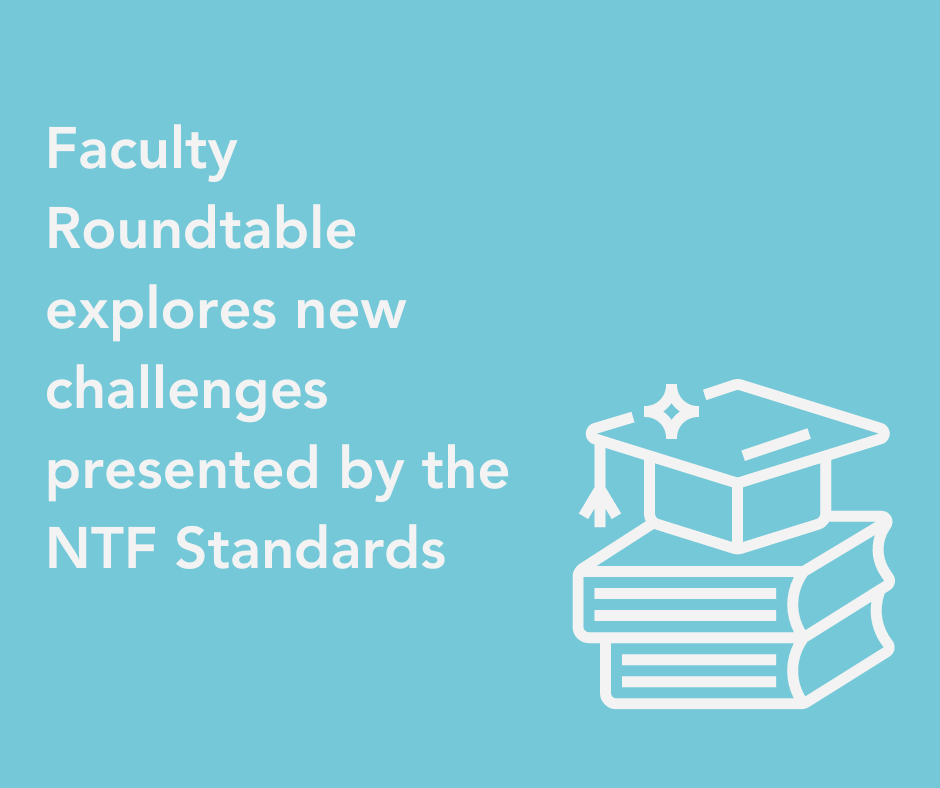APEA Faculty Roundtable focuses on competency and clinical hour requirements in new standards for NP education
Share:

Nurse practitioner faculty are watching with curiosity and caution as the steps for meeting new education standards begin to come into focus. Attendees at the APEA Faculty Roundtable on Feb. 14, 2024, said the new requirements for competency measures and increased clinical hours are two of their key concerns.
The educators who prepare NPs will play an integral role in demonstrating adherence to the 2022 Standards for Quality Nurse Practitioner Education (NTF Standards, 6th edition), said Lindsey Luther, DNP, FNP-C, CNE. Dr. Luther, a Nurse Practitioner Education Specialist for APEA, presented an overview of the NTF Standards and led the roundtable discussion. She said that in addition to demonstrating adherence, NP faculty will be important contributors to the design and development of curricula and processes to meet the standards.
Dr. Luther, whose academic experience includes roles as an FNP program lead, told attendees that guidance on the areas of highest concern may become available soon. A work group formed by the National Organization of Nurse Practitioner Faculties (NONPF) has drafted a competency implementation guide for NP faculty. The open comment period for the draft has closed, and an update is anticipated later in 2024. Faculty can view the draft, along with the slide deck from a January 2024 information call about the implementation guide, on the NONPF website.
During the Faculty Roundtable, Dr. Luther was joined by Betty Vicknair, MSN, APRN, PNP, a valued consultant to NP academic programs who is the Integration Specialist for APEA, and Jennifer Smith, MSN, APRN, FNP-C, ENP-C. Smith is a Nurse Practitioner Education Specialist for APEA.
The biggest changes will be in curriculum
The three panelists acknowledged that Standard III of the NTF Standards will require the most significant changes. “This is the meat and potatoes for faculty members,” Dr. Luther said. “It is where the biggest change is coming.”
Standard III, which focuses on curriculum, requires that faculty are able to demonstrate:
- how curriculum correlates with NP standards and competencies
- the rationale for course sequencing
- completion of at least 750 direct clinical practice hours in the student’s specialty, and
- evidence of interprofessional experiences.
“Academic partnerships will be integral to the structure of competency-based learning,” Dr. Luther said. “So, it’s a good idea to think about preceptorship models and flexible practicum planning.”
As voiced by attendees at the roundtable, competency-based education is a primary concern for faculty. Dr. Luther shared the following overview outline of an approach to creating a competency-based NP education model:
NP Competencies
- AACN Essentials: Level 2 subcompetencies (Advanced Nursing courses)
- NONPF Core Competencies (NP specialties)
Observable Behaviors
- Demonstrations of knowledge, skills, and attitudes
Assessment Methods
- Reliable, authentic measurements of desired behaviors
Educational Activities
- Teaching and learning resources
- Learning activities.
Some programs have begun laying groundwork
During the Q&A period of the roundtable, several faculty members explained how their programs are starting to prepare for implementation of the NTF Standards. (The document states an implementation goal of between 2025 and 2027, but because the changes require integration into accreditation procedures and certification processes in addition to academic institutions, the timeline may be moved out.)
Several attendees said their programs have implemented curriculum mapping, master evaluation plans, and system evaluation plans. Some have aligned each signature assignment to specific competencies, and some are using course leads to help provide consistency with each course (one attendee noted that this effort helps prevent drifting).
A few attendees shared that their programs perform onsite visits to preceptor sites to document students’ observable behaviors for psychomotor skills. The NTF Standards emphasize the need for more direct observation of students.
“Make sure that when you’re documenting observable behaviors, the evaluation is objective. The behaviors need to be measurable,” Vicknair said.
“Rubrics can help to keep you safe,” she continued. “As long as a student knows what’s expected of them, they should be able to perform. Having simulations ahead of time is one of the ways you can ensure they’re proficient in those skills.”
Dr. Luther added that faculty may have to adjust to this type of student monitoring. “We’ve done this in our heads for a long time, and we now need to be explicit in what we tell our students and preceptors,” she said. “Setting parameters can help ensure that students get what they need.”
The APEA Faculty Roundtable is a free event created to support NP faculty. To be notified of future Faculty Roundtables, follow APEA on LinkedIn or Facebook, and join our email list using the form at the bottom of this page. For information on how APEA resources can help NP programs meet the NTF Standards, email requestinfo@apea.com.